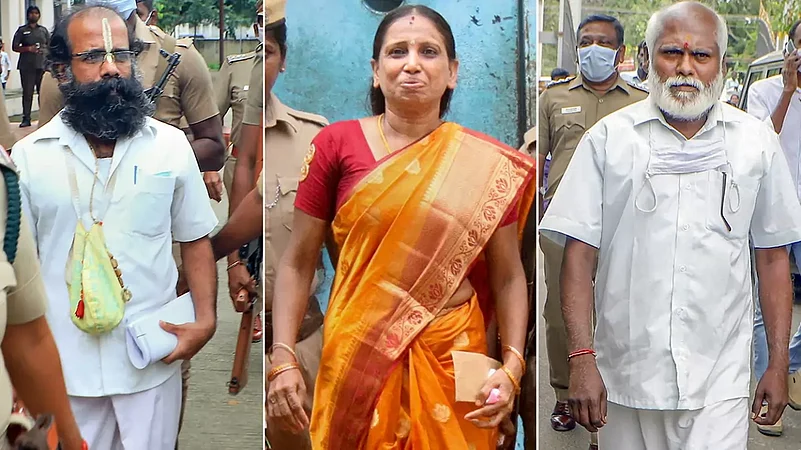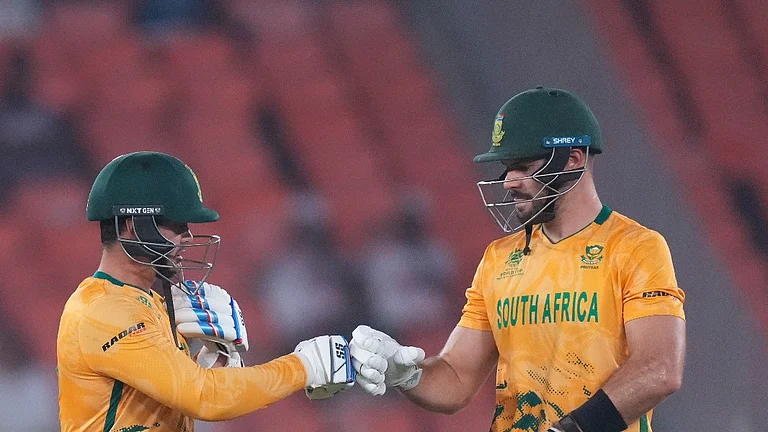The Supreme Court on Friday set free Nalini Sriharan and five other remaining convicts, who are serving life term for about three decades in the Rajiv Gandhi assassination case, noting that its earlier order releasing another convict A G Perarivalan was equally applicable to them.
The former prime minister was assassinated by a woman suicide bomber named Dhanu at a poll rally in Sriperumbudur in Tamil Nadu on the night of May 21, 1991. The blast killed at least 13 other people amd over 40 were left injured.
In 1999, the Supreme Court had confirmed the award of death sentence to Nalini, her husband Sriharan and two others. Nalini's death sentence was commuted to life term in 2000 by the Tamil Nadu government. Nalini and Sriharan were among the six convicts freed on November 12 following an order of the apex court.
Who were the killers of Rajiv Gandhi?
Nalini is the wife of V Sriharan alias Murugan, who was the first to be released. She was a stenographer at a private firm when she met Murugan, a member of the banned Liberation Tigers of Tamil Eelam (LTTE). She was the longest-serving woman prisoner in the country and was arrested in 1991 when she was 24-years-old. She has claimed that it was her firm belief that she is innocent that had kept her alive all these years.
Seven people were eventually arrested for facilitating the assassination of Gandhi. These included Murugan alias Sriharan, an LTTE operative from Sri Lanka, his wife Nalini who was an Indian citizen, Sri Lankan nationals Robert Pious, his brother-in-law Jayakumar and Ravichandran, along with Indian citizen AG Perarivalan who was charged with supplying a 9-volt battery for the explosive device.
The SC has previously held that the decision to eliminate Gandhi was precipitated by an interview he gave to a news magazine in 1990 where he stated that he would send the IPKF to disarm the LTTE if he returned to power.
Why were they released?
Sonia Gandhi had pardoned Nalini and even filed a clemency petition in the year 2000 that led to the reduction of her sentence.
Priyanka Gandhi Vadra met Nalini in 2008 in Vellore Central Prison in Tamil Nadu. Gandhi has reportedly turned emotional and cried when she met her in the Vellore Central Prison over a decade ago, Nalini told reporters here answering a question on the meeting.
Now a Congress party leader, she had then sought to know about the assassination of her father and Nalini said she divulged whatever she knew.
Years after the TADA Act was scarpped, the SC in 1999 upheld the conviction of only seven people and released all others, observing that none of those convicted were part of the nucleus of the assassination team.
In 1999, the top court sentenced four of the remaining convicts to death and the other three to life imprisonment. In 2000, the death sentence of one, Nalini, was commuted to life. In 2014, the SC commuted the remaining three death sentences, including that of Perarivalan.
In May, the Supreme Court invoked its extraordinary power under Article 142 of the Constitution and ordered the release of AG Perarivalan after he served over 30 years in jail.
The court added that its decision was also based on the prisoners’ ‘good behavior.’
How Congress reacted
The Congress on Friday expressed its disappointment over the Supreme Court's order directing the premature release of six convicts serving life sentence in the Rajiv Gandhi assassination case, saying it even "disagreed with Sonia Gandhi" on the matter. Addressing a press conference, Abhishek Manu Singhvi said the Congress would seek legal remedies.
When asked why Congress' reaction was different than Sonia Gandhi and Priyanka Gandhi, Singhvi said, "Sonia Gandhi, above all, is entitled to her personal views. But with greatest respect, party doesn't agree and has made our view clear."
After the release
Nalini claimed it was her firm belief that she is innocent that had kept her alive all these years.
To a question on lessons learnt in prison in over 30 years, she said jail is a "big university" where she learnt many things.
Asked if she has plans to write an autobiography-like book on her life in jail and legal struggle to secure release, she said her focus is only on living together with her husband Sriharan and daughter, who is in London.
When asked about the fate of her husband, Nalini's advocate P Pugazhendi said that the state government would decide. "Santhan had already expressed his intent to return to Sri Lanka. Initially, they may be lodged at the Sri Lankan refugee camp," he told PTI.
"It was a hellish experience in prison during these 32 years. My conviction that I am innocent has kept me alive all these years. Of course, regular yoga, medication and classes from IGNOU had kept me occupied in the prison," she told reporters in Vellore.
Has she learnt a lesson from her prison life? "It is a unique experience which nobody could learn. I learnt patience and forbearance," she said.
She expressed her resolve to join her daughter in London and be a homemaker taking care of her husband and her daughter. She exuded the hope that her husband too would join her soon.
She thanked the Central and state governments, and all those who had supported her release. "I am delighted and grateful that so many kind-hearted souls supported my release from prison," Nalini said and claimed that she did not have money even to pay her counsel, who unwaveringly argued her case in the court.
(With inputs from PTI)






















